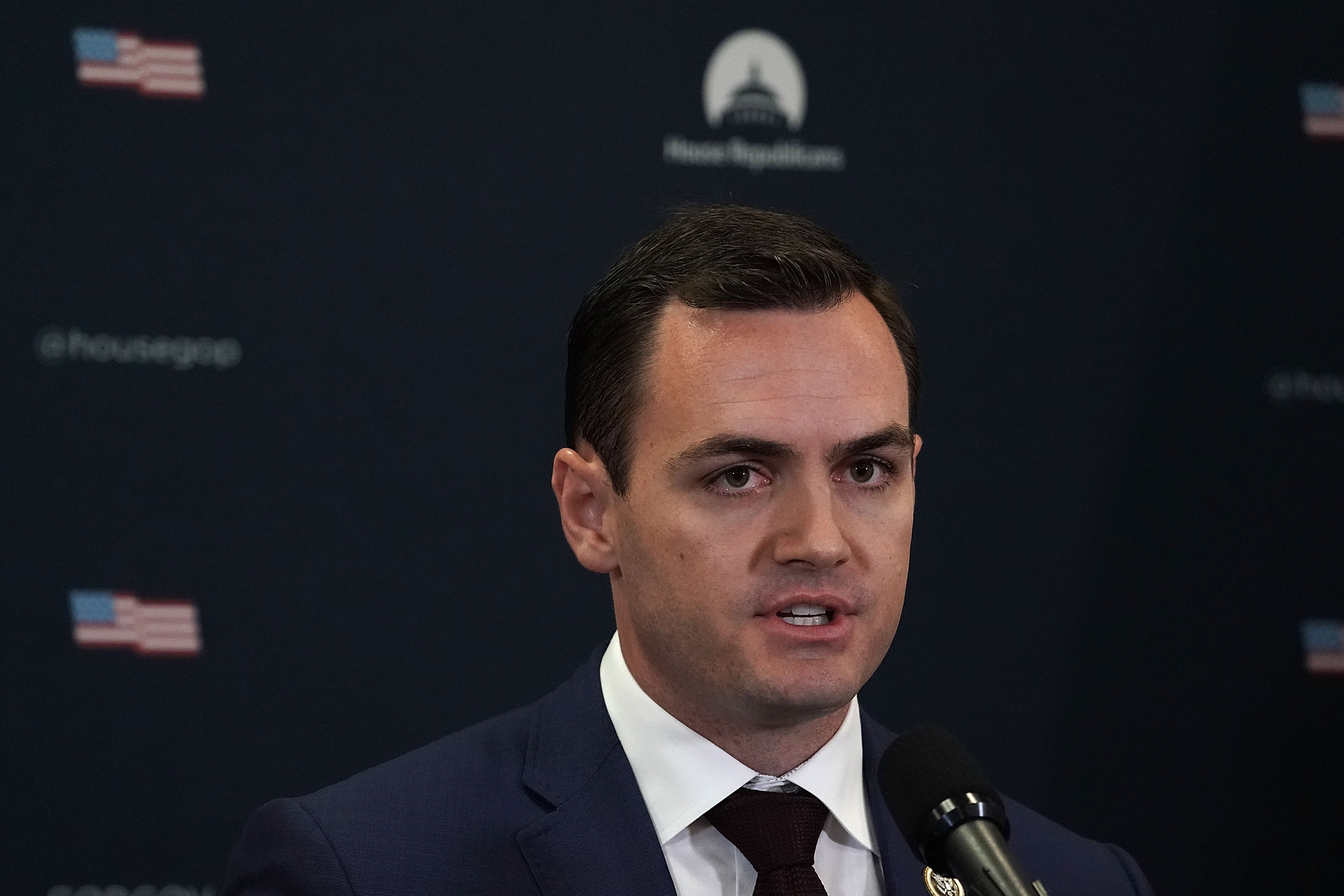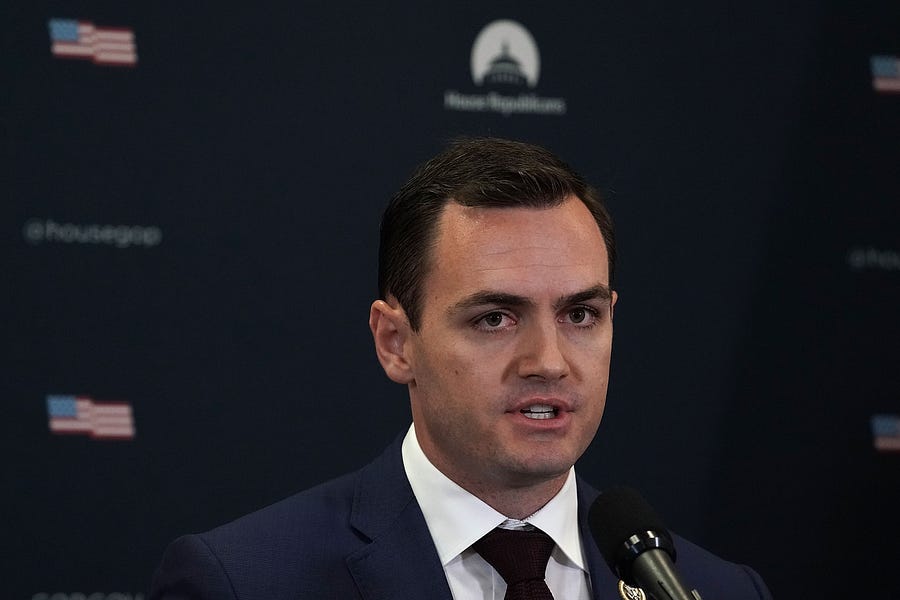
“If the dust settles, and all we have at the end of it is we've taken the world's top terrorist mastermind off the battlefield and they've lobbed a few missiles into the desert and beat their chest for their domestic audience, it's hard for me to interpret this as anything other than a massive win for the Trump administration.” —Mike Gallagher
In the wake of Iran’s attacks Tuesday night on the United States’ Ayn al-Asad base in Iraq, we talked to Rep. Mike Gallagher—who sits on the House Armed Services Committee and spent several months at the base during his service as a Marine—about what comes next in the region. Gallagher had been briefed on the attack by CIA Director Gina Haspel, Secretary of State Mike Pompeo, and Secretary of Defense Mark Esper at the time of our conversation, a transcript of which is edited for clarity below.
The Dispatch: Obviously we were glad to hear there were no casualties, Iraqi or American, resulting from the Iranian strikes last night. President Trump mentioned in his comments today that various precautions were taken in advance of the attack. Given your experience there, what kind of precautions and preparations would the soldiers at Al-Asad have taken?
Mike Gallagher: I think there are two important questions that still need to be answered that are potentially significant if we're trying to ascertain to what extent have we established a level of credible deterrence with Iran. And my working hypothesis is that we have. One is: Did the Iranians notify the Iraqis that this was happening? Presumably then that would've been back-channeled to us, and in that case our troops could have taken all manner of preparations in terms of hardening our positions on the base. And if we had specific intel about what types of missiles would be coming, that would have even helped us further.
But the question is also whether the Iranians deliberately missed, right? Whether they knew that the red line that they shouldn't cross is U.S. casualties and therefore did not want to incur any U.S. casualties. If that's the case, that's a big deal. I think that would demonstrate in a meaningful way that they understand Trump's red line, and that is incredible. One, this was largely a face-saving move. And if the dust settles, and all we have at the end of it is we've taken the world's top terrorist mastermind off the battlefield and they've lobbed a few missiles into the desert and beat their chest for their domestic audience, it's hard for me to interpret that as anything other than a massive win for the Trump administration and for our deterrence posture in the region.
Now, obviously the dust is still settling. I would expect they'll revert to their normal posture, which is to not launch rockets out of Iran, but to operate through proxies, potentially some cyber attacks, all the stuff they've been doing for the last year to test us. All the more reason why I think we need to maintain a strong presence on the ground in Iraq and regionally work with local allies to punch back whenever we can. Because the biggest hole in our Iran strategy and the maximum pressure campaign has been the absence of a ground game. Well, now we have a little bit of it. At least since 2003, we've never had intense economic pressure combined with a credible military deterrent. And certainly under Obama, even in Obama 1.0 prior to the JCPOA [Joint Comprehensive Plan of Action, or the Iran nuclear deal] negotiations, no one in the region seriously believed that Obama was ready to take military action against the Iranian regime. So we've never had a credible military deterrent, and certainly in negotiating JCPOA that deterrent vanished entirely. Now we have a combination of both things. That could be pretty effective, in terms of changing the behavior of the Iranian regime. We'll see. And there's more we can do on the economic front, too, to increase that pressure.
TD: In the past, Iran has retaliated to provocations weeks, months, even years later, in other locations, via proxy forces or via cyber attacks. Are we facing a threat of deferred retaliation, and if so, what can we be doing right now to forestall it?
MG: I do believe it's a threat. And we should be very aggressive in preparing for that. I think one thing economically, one thing we can do in Congress is to pass the [Rep. Liz] Cheney bill that I co-sponsored that ends all sanctions waivers. You know, I heard Rich Goldberg [a scholar at the Foundation for Defense of Democracies] kind of characterize it as we're at about an 8.5 out of 10 in terms of the pressure we can put on Iran. We can ratchet it up to 10, and we should do that. I think secondarily and related, we should take advantage of this to draw our European allies closer to our position. They're never going to fully support the maximum pressure campaign. But I do think now that Iran is abandoning any constraints of JCPOA, our P5+1 partners [the five permanent members of the U.N. Security Council plus Germany] need to recognize that the JCPOA is dead. And they should also be opposing Iran's use of ballistic missiles, which is sanctioned under U.N. sanctions that was obviously ignored under the deal. So those are some things we can do economically.
And then sort of taking advantage of the fact that there are a lot of people on the ground in Iraq that are celebrating the death of Suleimani and don't like Iranian influence in their country. And our message to them should be: the U.S. supports a free and independent and strong Iraq and we don't want the Iranians to dominate their country. So that creates an opportunity.
And then going forward, what really worries me is that we do need to take a look at our entire force posture not just in the Middle East, but in Africa, around the world, and figure out how vulnerable our positions are. I mean, look at the Abqaiq attack [on a Saudi oil processing plant]. With asymmetric capabilities, with very low cost equipment, they were able to inflict an enormous amount of damage on an oil facility. I mean, it raises questions about how vulnerable some of our forward positions are not only in the Middle East, but around the world.
So this is, I think, a wake up call for that, and that's a review that we should be doing before a catastrophe happens. For example, like if the Iranians had fired a bunch of cruise missiles at our position, at our bases, would we have been able to shoot them down? No, right? The answer's no. Like, the Army still doesn't have that capability, but the army is consuming 35 percent of the budget. So there's a lot of ways where we just assumed a level of domain dominance in the post-Cold War world, particularly in the Middle East where we don't have adversaries that even come close to challenging our power, that is quickly eroding with the proliferation of cheap tech that gives even middling powers like Iran the ability to frustrate us. If you're looking at this through the lens of like, what are the next three decades look at and how do we win a competition with China and deter great power war, this is an interesting laboratory to determine where we're strong and where we're weak.
TD: President Trump said in his comments today that “the American military has been completely rebuilt under my administration, at a cost of $2.5 trillion.” So would you say that that issue of military preparedness is primarily one of funding, or innovation, or how those funds are being deployed?
MG: I would say working with the president and his team, we have had some success on the funding front in the next two years, but it's going to be increasingly difficult to continue just to make the argument for more and more funds if we don't sort of tell a story to the American people about what we want our military to do and how we are going to do it. And I spend a lot of time focused on the future of the Navy. It is still not clear to me, particularly in light of a lot of recent mixed messages coming out of the Department of the Navy, that we have a coherent argument and story for why we need a Navy of at least 355 ships.
As I read the national security strategy, the national defense strategy—obviously I'm biased because I'm a Marine—I think it is a sea-power heavy strategy. And we're going to have to change our force posture and have not only more smaller surface ships around the world, which can move and therefore are less vulnerable to attack instead of bases, but also dispersed teams of Marines with long range fires that allow us to hold our adversaries at risk for very little cost compared to how we do it right now. So I think there's a bigger question about the right mix of sea power versus air power versus land power, and how that fits into our overall framework of great power competition and doing deterrence by denial that hasn't been fleshed out. And recently, the Navy's even backtracked on some commitments that it's made in the past with 355 ships and is actually undermining the president's position.
TD: It seems from everything I’m hearing and reading that neither Iran nor President Trump want further escalation in the region. Do you think the president's comments yesterday indicate that we are a) moving in that direction, and b) help us move in that direction?
MG: I do. Yes. I think so. And I think they were spot-on. I think the overall signal the president put out there of, ‘we're going to increase economic pressure but potentially provide Iran an off ramp for further [de]escalation,’ is the right one. And hopefully we can continue to signal that we're prepared to enforce that red line of, if you kill Americans, we'll kill you. And I think that's the right approach going forward.
Photograph of Rep. Mike Gallagher by Alex Wong/Getty Images.







Please note that we at The Dispatch hold ourselves, our work, and our commenters to a higher standard than other places on the internet. We welcome comments that foster genuine debate or discussion—including comments critical of us or our work—but responses that include ad hominem attacks on fellow Dispatch members or are intended to stoke fear and anger may be moderated.
With your membership, you only have the ability to comment on The Morning Dispatch articles. Consider upgrading to join the conversation everywhere.